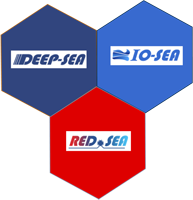COLLABORATIONs
As a major French player in HPC, CEA and especially its DAM Ile-de-France teams are taking part in national and European activities and projects.
In particular, HPC CEA DAM teams are strongly engaged at the European level. CEA is a PRACE hosting site and a founding member of ETP4HPC, and participating in R&D projects of the Horizon 2020 and Horizon Europe Programme and now of the Joint Undertaking for High Performance Computing (EuroHPC JU), bringing together funds from the EC and from the Participating States.

ETP4HPC – ETP4HPC - the European Technology Platform (ETP) for High-Performance Computing (HPC) - is an independent, industry-led and non-profit association. Its main mission is to promote European HPC research and innovation in order to maximise the economic and societal benefit of HPC for European science, industry and citizens. ETP4HPC is a private member of the EuroHPC JU, and suggests research priorities in the area of HPC technology and usage to EuroHPC via its SSRA, Strategic Research Agenda.
CEA is a founding member of the European Technology Platform ETP4HPC, and since then a member of its Steering Board.
The Human Brain Project aims to put in place a cutting-edge research infrastructure that will allow scientific and industrial researchers to advance our knowledge in the fields of neuroscience, computing, and brain-related medicine. This project, which will end in 2023, is today led by Ebrains AISBL. Ebrains will continue to provide these services to the neuroscience and brain-related community after the end of the HBP project.
CEA hosts the French HBP Node, and also offers computing services to the neuroscience communities in Europe at large.
PRACE, the Partnership for Advanced Computing in Europe, is a permanent pan-European High Performance Computing service providing world-class systems for world-class science. Systems at the highest performance level (Tier-0) are deployed by Germany, France, Italy, Spain and Switzerland.
The French Tier-0 HPC System "Joliot Curie" which is hosted at TGCC, operated by CEA teams, is funded and made available by GENCI and partly dedicated to PRACE.
Moreover, CEA has been taking part in the EU-funded projects “PRACE Implementation Phase” since 2010, supporting PRACE deployment and related services.
As part of The Human Brain Project, ICEI/FENIX provides a specific compute infrastructure (machines and services) to the community. To achieve this, five leading European supercomputing centres teamed up to develop a set of services federated amongst the different sites, in order to provide a seamless infrastructure for the scientists, in line with their respective national programmes.
The SEA projects aim to drive further the vision shared by the Jülich Supercomputing Centre (JSC), CEA (the French Alternative Energies and Atomic Energy Commission), Atos and ParTec, of the modular supercomputer architecture. The four core partners have gathered around them the best European skills, whether academic or industrial, to strengthen the European technologies that will equip the future European Exascale computers.
DEEP-SEA aims to improve the manageability and programmability of highly heterogeneous system architectures. DEEP-SEA is the natural continuation of the DEEP project series. It aims for easier programming of the Modular Supercomputer Architecture initiated by the DEEP-EST project – a concept that is already implemented in the JUWELS HPC system at the Forschungszentrum Jülich and in the EuroHPC MeluXina system in Luxembourg.
RED-SEA will look into the network interconnect - a potential bottleneck at the Exascale. It aims to extend and optimize the production-proven European interconnect BXI (BullSequana eXascale Interconnect) to make it capable to power the future European Exascale systems. As HPC systems increasingly need to interact securely with the outside world, including public clouds, edge servers or third party HPC systems, RED-SEA will also add a seamless interface with Ethernet. The project relies on technology developed within previous projects such as ExaNest and Mont-Blanc.
IO-SEA will cover the Input/Output and data management aspects that will help tackle the increased pressure on storage systems in the context of exascale systems. It aims to design and develop a novel management and storage platform based on object stores, allowing for hierarchical storage management (HSM) and on-demand provisioning of storage services. It leverages the results from the Sage, Sage 2 and Maestro projects.
The European Processor Initiative (EPI) is a project currently implemented under the first stage of the Framework Partnership Agreement signed by the Consortium with the European Commission (FPA: 800928), whose aim is to design and implement a roadmap for a new family of low-power European processors for extreme scale computing, high-performance Big-Data and a range of emerging applications.
The EUPEX pilot brings together academic and commercial stakeholders to co-design a European modular Exascale-ready pilot system. Together, they will deploy a pilot hardware and software platform integrating the full spectrum of European technologies, and will demonstrate the readiness and scalability of these technologies, and particularly of the Modular Supercomputing Architecture (MSA), towards Exascale.
EUPEX’s ambition is to support actively the European industrial ecosystem around HPC, as well as to prepare applications and users to efficiently exploit future European exascale supercomputers.
HPCQS aims to develop, deploy and coordinate a European federated infrastructure, tightly integrating two quantum simulators each controlling about 100+ qubits (quantum bits) in the Tier-0 HPC systems Joliot Curie of GENCI (operated at CEA/TGCC) and the JUWELS modular supercomputer at JSC. The seamless integration of quantum hardware with classical computing resources, creating a hybrid system, is an essential step forward to utilize the power of quantum computers for handling first practical applications.
The project started on December 1st , 2021, running for 4 years. The project is led by Prof. Kristel Michielsen of the Jülich Supercomputing Centre (JSC).
CEA plays a major role in HPCQS: CEA will host one of the quantum simulators in its computing centre TGCC and will assure its integration with the existing HPC systems.
Moreover, CEA will be very active in the development and adaptation of application and alogorithms to make full use of this new technology.
Ocean is an administration software stack to provide tools and documentation for heterogeneous cluster management.
It is composed in two sub projects Ocean-core and Ocean-stack :
- Ocean-core is a RPM-based distribution built upon a standard Linux distribution and provides packaged tools and software updates needed to manage HPC clusters.
- Ocean-stack (aka Deepblue) describes how to architecture core services required on HPC clusters, how to integrate third-party services and gives operating procedures to manage a HPC Cluster at scale.
International collaborations
CEA/DAM/DIF has strong relations with its sister labs in the HPC field.
Since 2002 CEA and RIKEN have been focusing on improving their supercomputing technologies and optimising a selection of scientific applications, in particular on ARM-based architectures. In the collaboration CEA/DIF/DSSI activities include, but are not limited to, programming languages and environments, performance evaluation, and system level features.
Joint laboratories
National Projects
"La Maison de la Simulation" is an entity involving regional partners (CEA, CNRS, Université d'Orsay et Université de Versailles - St Quentin), which is meant to motivate, support and stimulate the scientific communities to make the best usage of supercomputers, especially those deployed as part as GENCI and PRACE.
In particular, "La Maison de la Simulation" coordinates the Center of Excellence in Energy EoCoE, and is also a partner of Coordination and support Action FocusCoE.

















